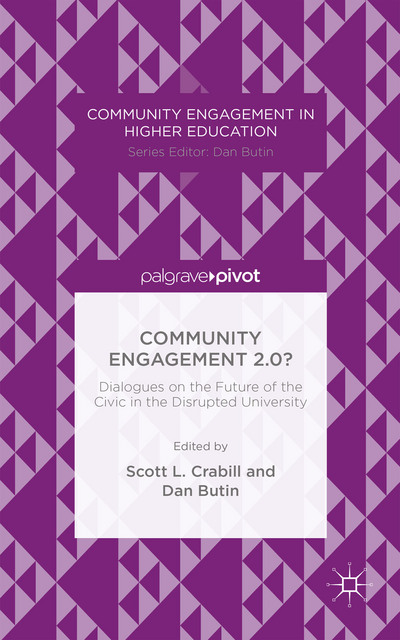This volume is an invaluable resource for anyone interested in the contemporary challenges faced by universities still struggling to adapt themselves to the online learning environment, writes Ignas Kalpokas.

Community Engagement 2.0? Dialogues on the Future of the Civic in the Disrupted University. Edited by Scott L. Crabill and Dan Butin. Palgrave Macmillan. 2014.
Find this book:
Much has been written on the arrival of Massive Open Online Courses (MOOCs) and the general move toward digital technologies and the online environment in current higher education. Some say this trend spells doom for the university as we know it, others offer ways to co-opt it, while still others doubt its relevance and longevity. The contributors to this volume take a narrower approach, looking at the impact this digitalisation has on civic education and community engagement.
The subject area of the volume is particularly pertinent, since it involves questions of what is the civic in modern societies, what is a community in an online learning environment, and what teaching is and should be given the current trends and student expectations. Overall, despite some sceptical voices, the contributors seem to be rather positive about the online shift, seeing it as easing access to education, forming new communities, and expanding outreach and engagement, since students, belonging to online education communities, can simultaneously transfer their new knowledge and skills to their physical communities, improving student retention and graduation rates etc.
But the new higher education environment is not without its challenges, to be sure. The universities are still largely undecided about how to react. Clearly, students expect different information, different qualities, and different teaching. Thus both delivery methods and curricula have to be rethought. Luckily, some of the chapters offer success stories and good practice guides of how success can be achieved in the new environment. Not surprisingly, the general urge is to embrace the spirit of the times and go with it before it is too late. But not without balance and some words of caution: as many contributors stress, there simply are some teaching qualities that only face-to-face instruction can offer and this refers to both the development of students and lecturers themselves. And that provides an even further challenge of reconciling the two forms of instruction.
Credit: Institute of Development Studies, University of Sussex CC BY-NC-ND 2.0
The volume clearly does not attempt to answer all questions but primarily offers a multi-perspective snapshot of the problem. It seems that universities are aware of the challenges and opportunities that online brings, but still largely questioning the possible ways forward, sometimes rushing to conclusions and sometimes overly hesitant, offering some good practice, and generally striving for a new personality. The university of today is, as the contributors aptly call it, ‘disrupted’. Clearly, the university will not disappear in the near future but it is clearly undergoing a paradigm shift.
But, as with any paradigm shift, there are also opportunities to create something new: new value, new methods, new syntheses of old and new. And this is what the book encourages us to think about. Sometimes openly provocative, at times offering limited closure, but generally intended to primarily provide food for thought, it is a call for practitioners to be more confident and creative. Arguably, the latter two qualities are paramount in dealing with the disrupted nature of modern higher education, allowing one to attempt to overcome seemingly unbridgeable gaps while not going into headless chicken mode (as evidenced by the reactions of some higher education institutions). Simultaneously, the volume is an invitation for researchers to further dwell on some of the themes outlined in the contributions.
The book is also interesting as it is published under the new Palgrave Pivot series, a new format offering authors a quicker turnaround and publishing. This is not a separate observation: the new format does have direct impact on the book itself and the feeling that one gets when reading it. My own view is that the series still lacks a clear identity of its own: the volume does read like a journal issue, it is generally designed as a collection of journal articles, the chapters themselves feel somewhat in-between journal articles and book chapters, and yet everything is published in an unmistakable book format. The processing speed perhaps has had an effect on the nature of the chapters as well: many of them seem to be slightly more observational (sometimes bordering on commentary) that analytical and are often shorter than the usual book chapter (some of them are only six pages). Undoubtedly, the format has its advantages. It is good for authors who need to get their work ‘out there’ quickly as well as for readers who need up-to-date analysis of current issues. With traditional publishing routines, it is almost unimaginable for a book to make use of data which is of the same year as the publication itself. As such, it might be an interesting response by the book industry to the researchers’ flight towards journal articles (even though, arguably, publication speed is not the only reason for this tendency).
Indeed, the book and the series are a good match, both being explorations of new forms and opportunities. And they both do what they say on the tin – or the cover, actually – by providing timely observations of a fast-changing environment and raising questions that are to be addressed by practitioners and researchers. It does not masquerade as a monumental long-standing study – after all, its very subject precludes that. But the volume definitely is an invaluable resource for anyone interested in the contemporary challenges faced by universities still struggling to adapt themselves to the online environment.
Ignas Kalpokas is a PhD student in Politics at the University of Nottingham, working on a dissertation on Baruch Spinoza, Jacques Lacan, and Carl Schmitt. He holds his Masters degree in Social and Political Critical Theory and Bachelors degree in Politics from Vytautas Magnus University (Lithuania). He has also worked on various educational projects and initiatives. Ignas’ research interests lie in the investigation of interrelated concepts of sovereignty, the state, and the political as well as the formation and maintenance of (national) identities. In addition, his research also involves history, literature, and international relations theory. His preferred theoretical framework is mostly Continental philosophy. Read more reviews by Ignas.








